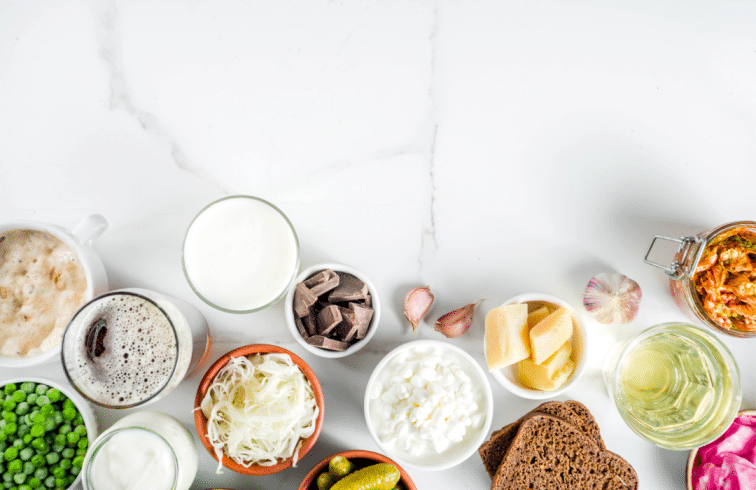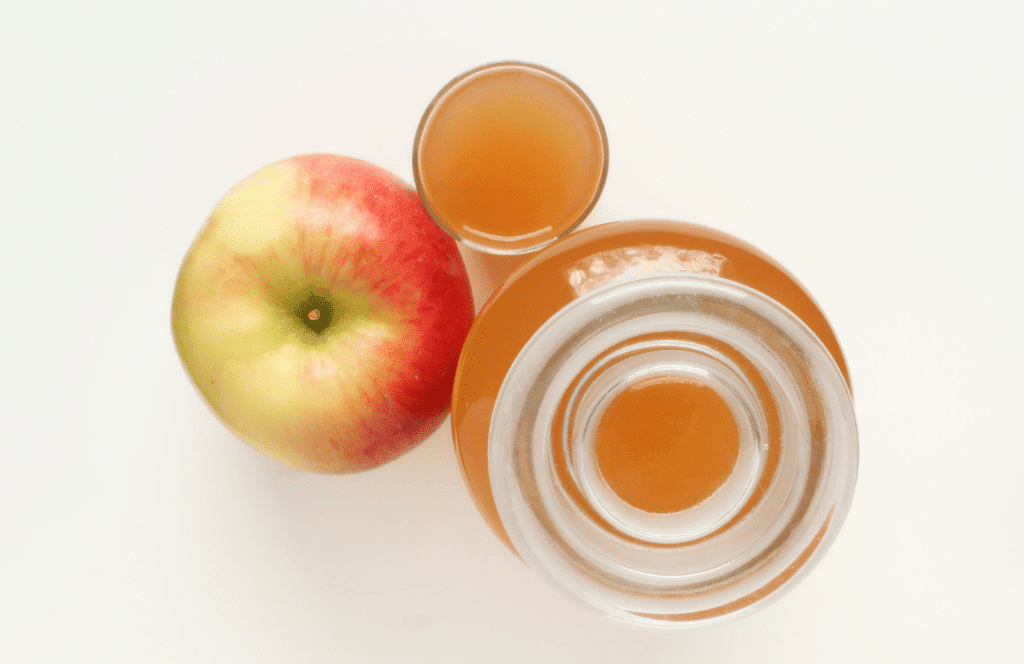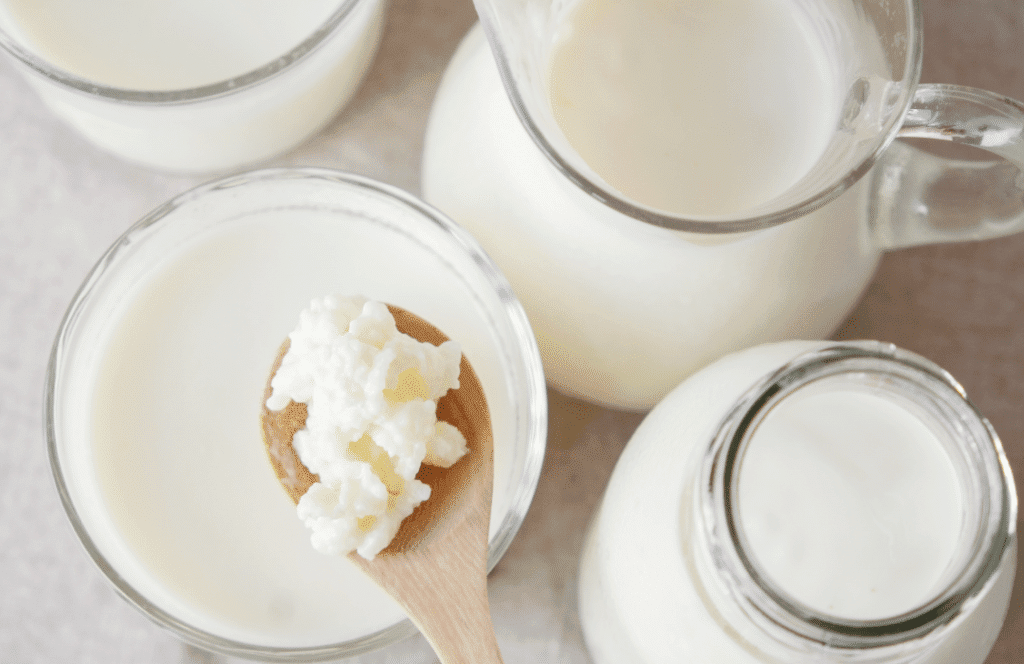
The concept of ‘fermented foods’ is very easy to turn your nose up at. A common misconception is that fermented foods have a funky smell and appear to be past their sell-by-date. The word may even be reminiscent of watching poor celebrities on I’m A Celeb having to eat a fermented ostrich egg…not something we’d particularly like on toast!
However, these celebs haven’t got it half bad, as fermented foods are considered delicacies in many cultures and cuisines. In fact, they have been thriving in consumers’ lives due to their beneficial properties and, more specifically, probiotic properties.
Let’s take a look at what the best fermented foods are and explore the benefits of fermented foods for gut health…
What are fermented foods?
Fermented foods are those that have been through the process of fermentation. Fermentation used to be the process for preserving foods and has been around for centuries. However, more recently, fermentation is being used to glamify our daily essentials, bringing them an added ‘health kick’. Think of the bog standard pizza…well, now you can get a sourdough base and guess what…it’s fermented.
Fermented foods are a growing trend and we’ll start to see a lot more product innovation with consumer goods and fermentation in the coming years; from kombucha to kimchi, the market is already growing.
Fermented foods for gut health: the lowdown
So, what are the benefits of fermented foods for gut health? Fermentation is an anaerobic process where microorganisms in food, such as yeast and bacteria, convert carbs like sugar and starch into acids or alcohol. These are what give foods their preserving capabilities and the ‘sour’ taste.
During the fermentation process, the growth of ‘healthy bacteria’ or ‘live microorganisms’ are promoted. This is where we talk about probiotics.
To put it simply, by consuming fermented foods (aka probiotics), large amounts of healthy, live bacteria are added to the gut, which can help with a number of different things:
- Firstly, by improving digestion thanks to breaking down food better and enabling better nutrient absorption;
- Secondly, probiotics can help to boost immunity, as 70% of our immune system is found in our gut;
- There is also plenty of research showing that probiotics can improve mental health through the gut-brain axis, aid weight loss, and improve heart health.
Prebiotics are where people commonly get confused. These are also crucial for improving gut health by feeding these live microorganisms or healthy bacteria – this is what Aguulp for Gut does. Like watering a plant, your gut bacteria needs to be constantly fed to keep it feeling healthy and happy.
The most common types of good gut bacteria are Lactobacillus and Bifidobacterium; however, we must be aware that not all fermented foods contain probiotic strains. Any foods that have been pasteurised have lost their probiotic capability due to killing off the healthy bacteria during the process – processed foods have their bad street cred for a reason!
Examples of fermented foods
Some examples of fermented foods that are great for gut health include:
- Apple cider vinegar
- Sourdough
- Sauerkraut
- Kimchi
- Kombucha
- Miso
- Soya sauce
- Tempeh
Let’s take a look at some of the items on our fermented foods list a little more closely…
Fermented foods for gut health: apple cider vinegar
Apple cider vinegar or ACV is made from apples and water. When left for a long period, bacteria convert the sugar in the apples into an alcohol, which is then converted into acetic acid. During the fermentation process, strands of ‘The Mother’ will form, which is what gives it probiotic capabilities. With this in mind, always make sure you buy raw apple cider vinegar with ‘The Mother’ in it. Many apple cider vinegars you find in the supermarket have been pasteurised, which kills off the healthy bacteria, leaving it with little health benefit.

Tip: Add a tablespoon of ACV into your glass, squeeze half a lime, and pour over some tonic water (or sparkling water) and add ICE. There you have it…your very own gut-loving alcohol-free G&T!
Fermented foods for gut health: kombucha
Kombucha is another gut-loving consumer good, which is a type of fermented black and green tea. Kombucha is made by boiling tea, adding sugar, leaving it to cool, and adding what is called a SCOBY (Symbiotic Culture Of Bacteria and Yeast), which gives it probiotic capabilities. The bacteria and yeast in the SCOBY break down the sugar, turning it to alcohol and then into acetic acid. Kombucha is not just a probiotic, as it also contains powerful antioxidants that can fight off harmful bacteria. In addition, due to its acidic nature, kombucha is a great non-alcoholic drink if you’re also looking to improve your gut health.

Kombucha recipe: Why not brew your own kombucha? Simply buy some big Kilner jars (You can find them from Amazon), get some regular black and green tea, sugar, a SCOBY starter, and you’re well on your way. Your jar should then be left at room temperature away from sunlight. You can try it each week to see if it’s right for you, but typical brewing times can be between 2-4 weeks. Once you have your first SCOBY, you can make countless batches, as each SCOBY produces a baby SCOBY for you to use in your next one.
Fermented foods for gut health: kefir
Kefir is another great probiotic food source. Its name in Turkish (keyif) even translates as ‘feeling good after eating’. Kefir is a fermented milk drink, originally made from cow’s or goat’s milk; however you can also find it made from plant-based alternatives, such as coconut and soy.
Kefir is made by adding kefir grains (which contain microorganisms) to milk to ferment the sugars and convert it into kefir. In the same way you remove the SCOBY when making kombucha, kefir grains are also removed to create a new batch. You can find kefir in many supermarkets, in a drinkable form but also a thicker, more yoghurt-like consistency.

Tip: Due to the kefir grains converting the lactose in milk into lactic acid, it does have a ‘sour’ taste. This may not be for everyone, so consider opting for a bio-yoghurt instead. Bio-yoghurts, or yoghurts with ‘live active cultures’ in them, are just as good for nourishing your gut. These yoghurts either already have healthy bacteria in them, or have them added after pasteurisation. Remember to read the labels to see if they have those buzzwords, or look out for Lactobacillus and Bifidobacterium in the ingredients!
Support your gut health with probiotic supplements
Fermented foods are a great source of probiotics, but so are gut health supplements. Our Gut Probiotic daily synbiotic formula contains both prebiotics and probiotics to help jumpstart your gut health. Add this gut supplement to your daily routine to introduce good gut bacteria to your gut to help rebalance your gut microbiome, for similar benefits to those you’ll get from fermented foods.
If you don’t like the sound of eating fermented foods, taking a probiotic supplement may be a better option for you. Shop our full range of gut health supplements.
Resources:
https://www.heartfoundation.org.nz/about-us/news/blogs/fermented-foods-the-latest-trend
https://www.healthline.com/nutrition/fermentation#bottom-line
https://theconversation.com/is-apple-cider-vinegar-really-a-wonder-food-86551
https://www.healthline.com/nutrition/8-benefits-of-kombucha-tea
https://www.healthline.com/nutrition/9-health-benefits-of-kefir
https://www.bbcgoodfood.com/howto/guide/health-benefits-kefir
https://www.healthline.com/nutrition/7-benefits-of-yogurt#TOC_TITLE_HDR_5
